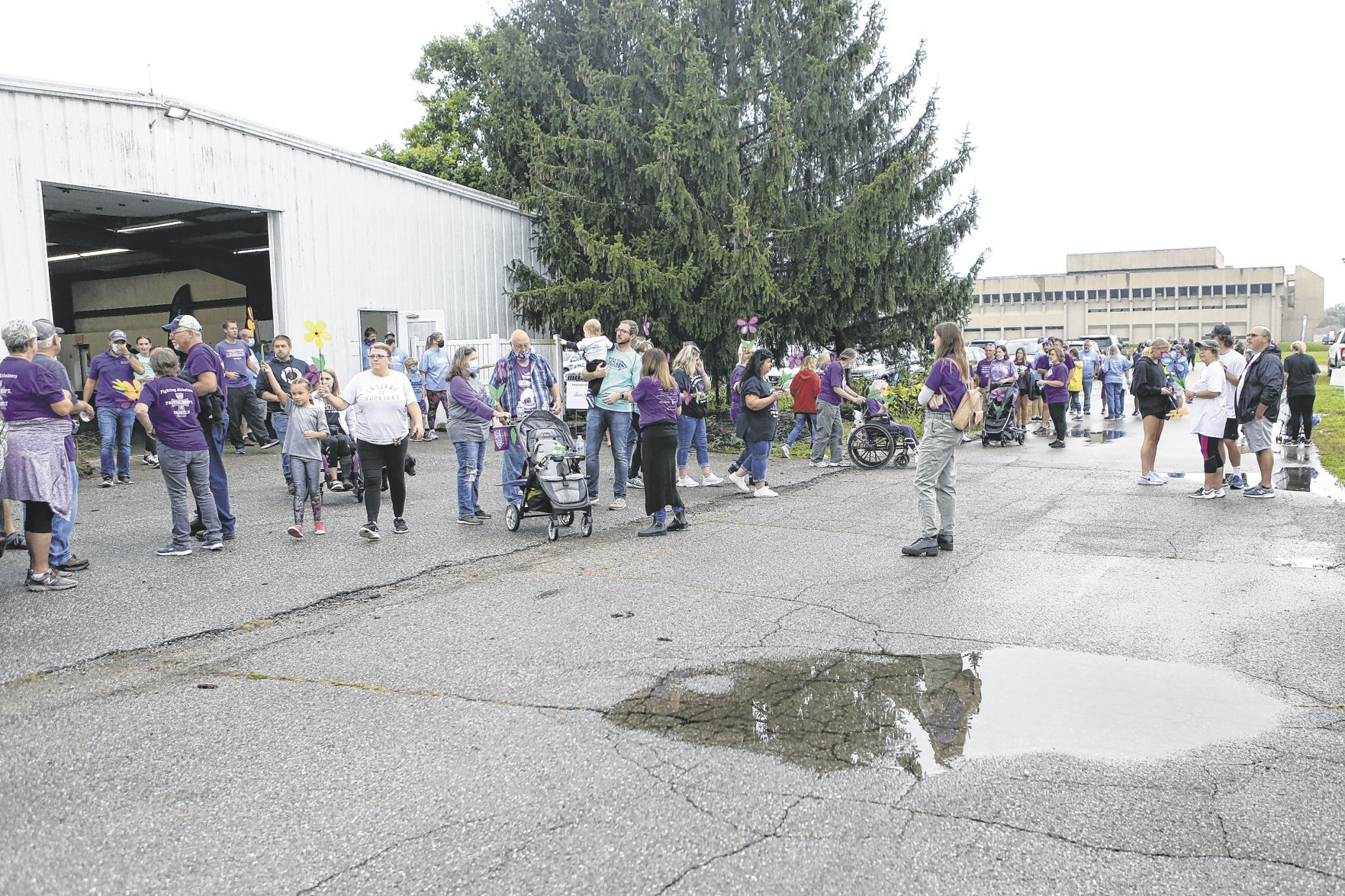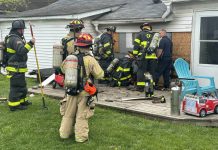A Hartsville woman today marks her 90th Memorial Day with memories still vivid enough to re-live the World War II era. Since her use of a wheelchair makes it difficult to be out and about, she plans to observe the holiday at home with her family and dog, Ash.
June DeSpain McKay is not a military veteran, but a civilian who tended to veterans while working at Wakeman General Hospital at Camp Atterbury near Edinburgh.
At age 16, the Hope native — then known as June Bell — dropped out of high school to join hundreds of area civilians to help the United States war effort close to home.
Hired to work in the hospital’s food service and tasked with taking food carts into hospital wards, the young woman got her first, vivid look at war’s unforgiving price.
[sc:text-divider text-divider-title=”Story continues below gallery” ]
Wanting to help the military patients in any way she could, DeSpain McKay soon transferred to work in Plastic Surgery Ward 2B, a place where she and other teen girls grew up in a hurry, she said.
“It was a strange time to live in the world, for a young person to see that,” DeSpain McKay said.
Seventy-three years later, she still has some photos and many memories from her time with patients inside the hospital.
During World War II, Wakeman was the U.S. Army’s largest convalescent hospital, specializing in neurosurgery, plastic surgery and bone reconstruction, according to the Indiana Military Organization. The hospital treated more than 85,000 soldiers during 1945 and 1946.
Patient after patient came through the halls of the ward, and DeSpain McKay saw young men with missing limbs and once-handsome faces now in need of ears, noses, eyes and sometimes full-facial replacements.
“In plastic surgery, there was just surgery after surgery after surgery,” DeSpain McKay said. “When they got back from surgery, it was always awful because they were sick, in pain, uncomfortable.”
The worst were the burn patients, she said.
“The most serious facial damage was the burn-scarred patients,” DeSpain McKay said in a remembrance she wrote in 2001. “It was also the most difficult to repair and the slowest to heal following surgery.”
Although the injuries were horrible, DeSpain McKay said she witnessed doctors and nurses who performed “all sorts of amazing things” with plastic surgery.
She saw doctors create new ears and noses, and portions of bone taken from other parts of the body were used to re-create eye sockets and more. She particularly remembers a skin-grafting process where a patient’s arm was held immobile above the head while a tube of living tissue was connected to the underside of the arm and to the face. Soldiers would stay in this uncomfortable position for weeks, DeSpain McKay said.
Now 89, some of DeSpain McKay’s memories have begun to fade, but she can still relate tales of some patients, such as a soldier named Billy.
Her blue eyes lit up as she spoke of him, a soldier just a few years older than she was, from Louisville, Kentucky, she said with a grin. But her smile disappeared as she recalled his wounds. He still had eyes that could see, and his nose and mouth were intact, but the rest of his face was gone, DeSpain McKay said.
Somehow the soldier and others like him remained in good humor, DeSpain McKay said, thinking back.
“I guess they were proud to be alive,” she said.
Post-war years
Wakeman General Hospital closed in 1946, a year after the end of the war, and DeSpain McKay resumed her pre-war life. She returned to school, taking a mix of high school and college classes for a time in Hope.She married a military veteran, Delbert DeSpain, in 1947. He had served in the 1st Platoon, D Battery, 534th AAA Battalion, 103rd Division. DeSpain had fought his way through Europe, including France, Italy and Germany.
The couple raised two sons, Steven and Rodney, and were married for 47 years until Delbert’s death at the age of 72 in 1994.
About five years later, she married family friend and widower Duane McKay. He died about a year ago, said her eldest son, Steven DeSpain.
DeSpain McKay’s hands now show the signs of a life of hard work.
“I must have been busy, the doctor said, for these muscles to be worn out,” she said, studying her hands and pointing to the muscles in her palm.
After Wakeman and schooling, her career took off with Cummins in the 1940s.
“She was the first female to work in the drafting department in Cummins,” son Steven DeSpain said.
After Cummins, DeSpain McKay joined the plastics department at Hamilton Cosco, known today as Dorel Juvenile Group. She later moved to a position in quality control at Cosco and would remain there until she retired.
“Nobody could do her job but her,” Steven DeSpain said. “They really begged her to stay.”
Preserving history
Eventually, DeSpain McKay returned to Camp Atterbury, this time to preserve World War II-era history inside the Camp Atterbury Museum.She passionately recorded her time at Wakeman through photography, bringing her camera with her on the bus each morning. These snapshots contain glimpses into life at Camp Atterbury, including her co-workers, the patients she knew and loved and even the grounds of Wakeman.
DeSpain McKay donated her beloved photo and souvenir collection to the museum years ago, said James West, a friend of DeSpain McKay who worked with her at the museum.
In 1999, DeSpain McKay said she was proud to see her pictures on the museum wall and Delbert DeSpain’s wartime photos in various cases, along with “an 8-by-10-inch photo of him, so young, healthy and handsome, taken in Germany.”
But for DeSpain McKay, her donation and work at the museum are more than just memories. They are an effort to ensure the world remembers World War II, as well as the sacrifices that came with it.
“What would our world be like now if Hitler had not been stopped?,” DeSpain McKay said in a 1999 interview with West for the Indiana Military Organization. “Who else but our soldiers could have stopped him? I think we must always remember what really happened back then.”
[sc:pullout-title pullout-title=”June DeSpain McKay bio” ][sc:pullout-text-begin]
Age: 89
Birthdate: April 23, 1928
Resides: Hartsville
Family: Husbands, Delbert DeSpain (deceased), Duane McKay (deceased); sons, Steven and Rodney DeSpain; two grandchildren; two great-grandchildren.
Hobbies: Photography, family, her dog Ash and flowers.
[sc:pullout-text-end]





